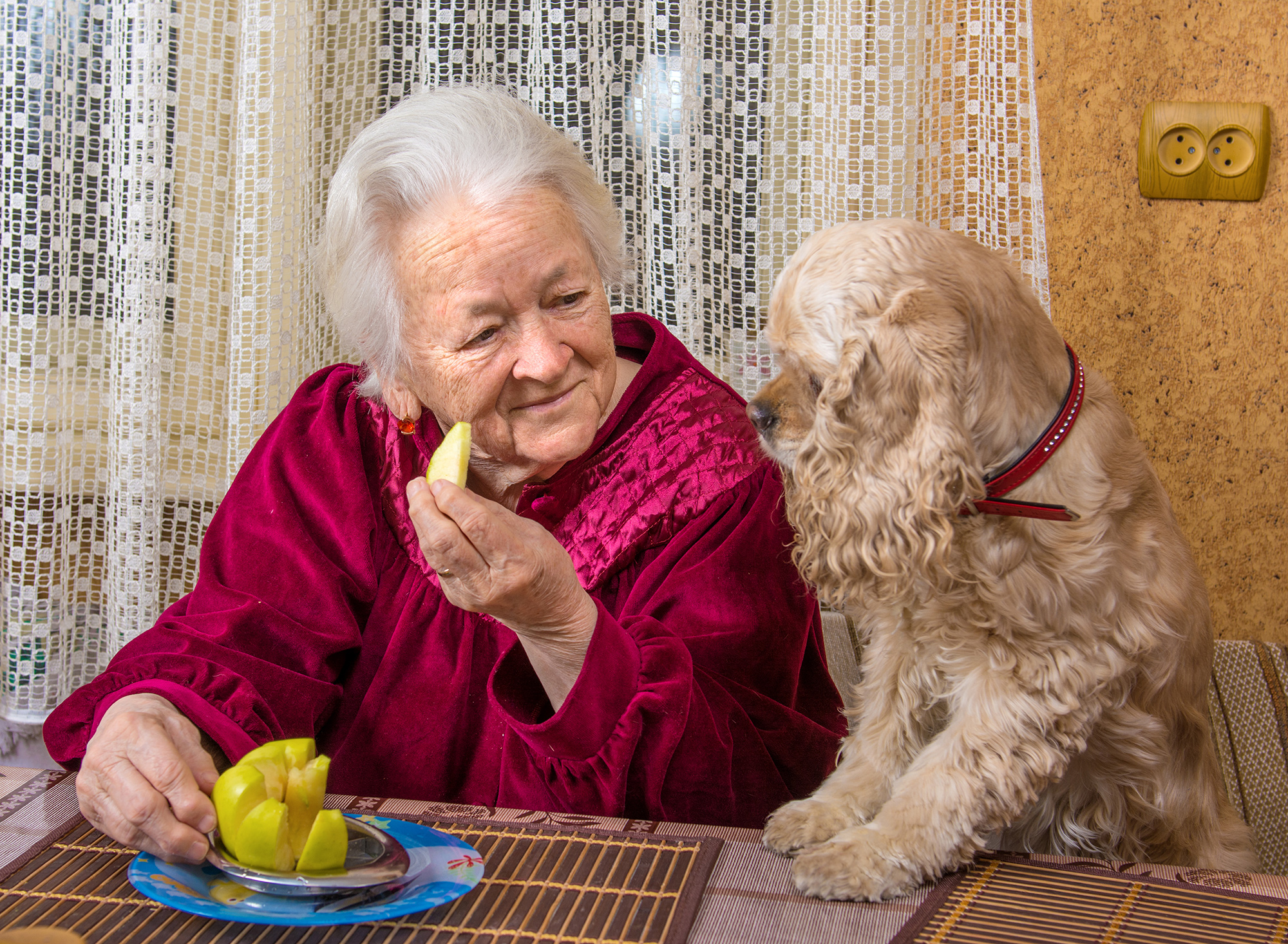SIZE
The Power of Paw-sitivity: How Pets Impact Lives in Memory Care
Man’s best friend is also the mind’s best friend. Pets have a playful innocence, show unconditional love and are trusted companions. With a cute and cuddly disposition, what is not to love — pets make us smile! Whether you consider yourself a dog, cat, fish or bird person, these furry, fin and feathered friends impact lives in so many wonderful ways — especially for those requiring memory care supports.
According to recent studies, there is a link to pets and memory care. Researchers are finding that “owning a four-pawed friend is linked to slower cognitive decline by potentially preserving specific brain functions.” The study also interestingly observed that cognitive decline depended on the pet: “dog owners were found to retain shaper memory, while cat owners showed slower decline in verbal fluency.” When it came to fish and birds, no significant link was made to slowing cognitive decline.
“It is possible that interaction with dogs and cats provides unique cognitive stimulation, which may be less pronounced in other, less demanding pets,” cited the researcher Adriana Rostekova in the Guardian article about the studies.
Depending on the stage of a loved one’s dementia diagnosis, caring for a living pet may not be an option. That is where pets visiting a memory care community or even the robotic or stuffed animals can make a resident’s day. Studies show that these types of toys provide comfort for people with mid- to late-stage dementia who may become angry or agitated. These toys can be called upon at any time of the day, when behaviors start to present themselves providing an opportunity for an almost instant calm.
“This can be a hard stage of the disease for family members because it appears that their loved one is reverting to playing with stuffed toys, however, that is not the case,” said Joel Kroft, Executive Director of Memory Support Services at Ecumenical Retirement Community. “These objects are tapping into core memories and a time of life with great purpose.”
Through pet therapy programs, such as the Nurture Therapy program in Ecumenical’s Connections Memory Support Services neighborhoods, residents receiving memory care supports are benefiting from interactions with animals every day in the programming.
Whether they are seeing and loving on the pets who reside on our pet-friendly campus, meeting animals from organizations that visit our residents or spending time with animatronic or stuffed animals, pets are positively influencing our memory care resident’s emotional and physical health through companionship, improving interaction and focus, prompting reminiscing, encouraging movement, reducing anxiety and other health markers.
Addressing loneliness
The 2024 National Poll on Aging from the University of Michigan found that nearly one in three adults ages 50-80 reported feeling lonely and those feelings only become more pronounced with age. When the effects of memory loss are added to these loneliness trends, it can be a slippery slope for mental health. When a wagging tail walks through the campus doors, residents can feel the companionship and the feelings of sadness and maybe even depression make way for feelings of safety and love when they are laughing and smiling with a therapy animal.
Improving Interactions and Focus
Interacting with animals keeps the brain engaged. Through the gentle movements of petting a dog or watching a bird flutter in the cage, a memory care resident could tap into memories of a childhood dog or maybe a trip they took where there were exotic bird watching experiences. Pets could prompt residents to share stories, converse with neighbors and co-workers and engage with family and friends in a deeper way.
Encouraging movement
Even the simplest movements that come with interacting with animals are prompting exercise. Whether it is walking a dog, reaching to pet a cat, stretching to point to the bird in a cage, these movements are supporting a resident’s mobility and balance without them even noticing.
Reducing stress and behaviors
Ever noticed that spending time with animals can actually be relaxing? Even for residents experiencing memory loss, there is a calming effect that pets have in a resident’s day. Studies show that quality time with pets can positively impact the memory care by lowering blood pressure and heart rate. Additionally, pets can also provide relief from sundowning — the period in the day when individuals with dementia could experience increased agitation and restlessness.
Memory Care in Harrisburg, Pa.
To learn more about memory care at Ecumenical Retirement Community, specifically the Nurture Therapy program or our pet-friendly campus, contact an advisor to schedule a visit. We look forward to meeting you (and maybe your pet!)
Categories:
- All
- Alzheimer's
- Assisted Living
- Blood Drive
- car wash
- caregiver
- christmas
- Community Blood Drive
- community event
- Comparing Retirement Community Costs
- Dance
- dementia
- dining
- donate
- donations
- easter
- easter bunny
- easter egg hunt
- ecumenical
- exercise
- fall prevention for seniors
- family
- Family Community Event
- For Adult Children
- grace
- Grandparents Day
- health
- holiday season
- Holidays
- Independent Living
- Kids Event
- Memory Care
- moving to a retirement community
- Personal Care
- pets
- retirement community
- retirement home
- Safety
- social activities
- the longest day
- tree lighting
- trial stay
- V Day
- winter

